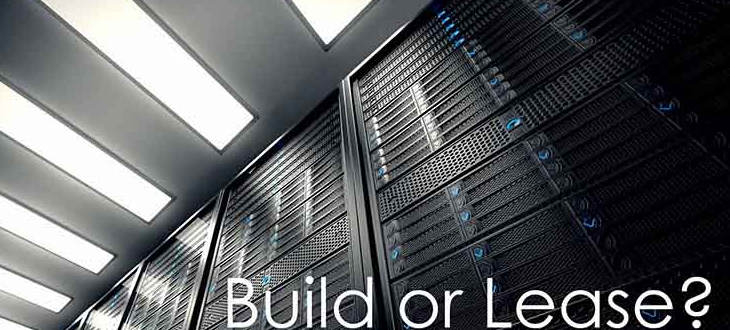
‘Lease versus Build’ Data Centre Debate
Data Centres: “to lease or to build?” That is the question for organizations across the globe today. However, if the truth be told, there is no single answer. While leasing or outsourcing your data centre to a specialist team dedicated to managing IT services means they carry the risk and are able to offer the support you need to focus on core activities, keeping the management of data centres or servers in house may be more suitable for other organizations that can afford the staff capacity and the upfront capital to invest in the IT infrastructure needed to operate their business. It all depends on your financial model along with a number of various factors.
Given the current economic conditions however, industry experts are witnessing a sizable shift towards the former where more and more companies particularly in the region are looking to find ways for IT investments to boost productivity, increase business efficiencies and enable innovation without the need for capital investment. In fact, while multinationals have paved the way in leasing data centres to specialized third parties, industry reports reveal that a growing number of both small and medium size companies are also considering the leasing option.
There are however, a number of factors to consider before taking the plunge and would also help both CIOs and CEOs to decide whether leasing or building their own data centre is the way forward:
Flexible Business Model
A major driver in opting to lease data centre services is the need to find a business model that works in a climate that is unpredictable. Companies today are looking to lease their data centres which enable them to adapt to a volatile economic environment and capitalize on a service provider that offers skilled resources and standardized processes for efficient delivery of IT operations. In addition, more and more organizations are moving from investing in upfront Capital Expenditure (CAPEX) to an Operational Expenditure (OPEX) model which allows companies to ‘pay as you go’ and reduce overall risks. At the same time, a guaranteed level of service is offered with Managed Service providers offering High end Service Level Agreements.
Core-Business Focus
Organizations also turn to leasing data centres because of the need to focus on its core-business activities. A survey conducted in the region recently revealed that given the increasing complexity of networks, many organizations were open to the idea of having their data centres managed by a third party company with the skilled manpower and process maturity for IT support and service delivery. An experienced team of qualified resources is key in providing reliable service levels and also optimizing use of the latest technologies available in the market.
Consolidation and Centralization
Another driver is IT budget constraints organizations are being faced with. While numerous companies either no longer have the budget or are willing to hire people or invest in infrastructural technology that will ultimately, present itself with spiraling costs, companies are now looking to consolidate and centralize their IT infrastructure to achieve economies of scale. In this way, investing in their own Data Centre along with other services including Hardware, Storage, Software licenses, Backup, Security, Network infrastructure, maintenance and support can be reduced by leasing the same to a Managed IT Services provider.
IT-Business Alignment
The global economic recession has forced companies to realign their IT activities into becoming a business enabler where it can add value and offer a competitive edge rather than being a mere back office support function. Gone are the days where company data was filed away into boxes for storage and where IT services to manage data centres and servers were simply offloaded to a third party company. The Managed IT Services market has evolved into developing a customized solution that allows customers to leverage their IT environment for business benefits and reduced risks.
Heightened Security
Data security is paramount on everyone’s agenda and in essence, defines an organization’s competitive edge. To ensure it is carried out effectively, huge amounts of investment are needed to put in place high levels of physical and virtual security, making it a very costly for IT departments. While reports reveal that about 80-90 per cent of data theft happens internally, leasing data centres to a specialist third party provider ensures that security standards are met and complies with International Standard Organizations (ISO) including ISO27001; a world recognized industry standard acknowledging that managed service providers implement at the highest data security standards across all departments, data centres and security operations.
In rapidly changing conditions, a flexible business model along with the savings an organization makes on technology investments for running their critical business operations are invaluable. In the case however, where there may be little regulatory procedures, or where bandwidth costs may be high, building your own data centre could be a less costly and more controlled option in the long run, even if it is cheaper at the offset. To add to the mix, organizations are also faced with the Cloud Computing trend, an emerging IT revolution that is said to have 80 per cent of Fortune 1000 companies adopting by 2012, and also enables applications and web space to be stored and powered via the web.
Whether you opt to lease or to build data centres, or even take to Cloud Computing services, one thing is sure: do your research and understand the risks. Put together a full assessment of business strategies so you can be confident that you are making the right decision for your business.
Know More
